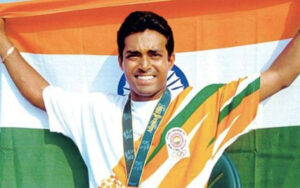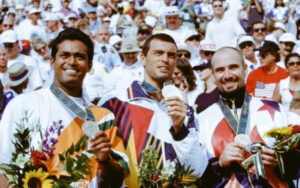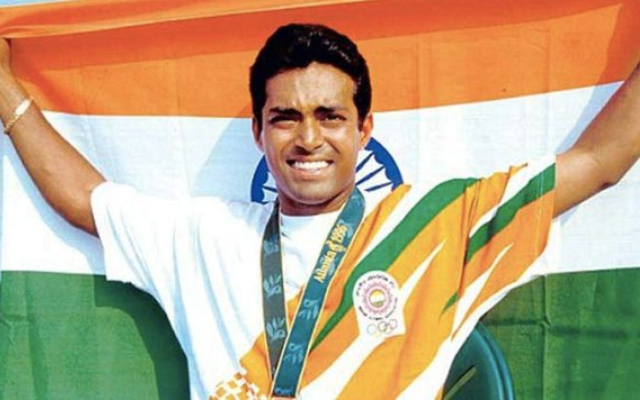
The long wait for an Olympic medal after the 1980 Moscow Olympics was agonising for India. Three Olympics after that, 1984 Los Angeles, 1988 Seoul and 1992 Barcelona, saw India return empty handed.
It, then, needed one magnificent effort from Leander Paes to quench the thirst of Indian fans. The historic bronze medal Leander won at the Stone Mountain Park in Atlanta, USA, in 1996, will always rank high on the emotional quotient. Those were the days when politics in Indian hockey was at an all-time high, no matter who the coach was. So, results were disastrous in Atlanta, with an ineffective President KPS Gill presiding over the federation (IHF).
If at all a medal had to come, it was some sort of a miracle which India was praying for. Sure enough, the boy-turned-man, who had produced many adrenaline-felt performances in the Davis Cup arena, Leander, was India’s dream medal winner in Atlanta.
Emotions, pressure, raising his level of play, Leander had done that repeatedly on the big stage. The Davis Cup was a theatre he had always enjoyed. That is why, his overall 93-35 win-loss record in the Davis Cup, singles and doubles included, spread over two decades, stays right at the top.
Playing for the nation, the first ever time in a Davis Cup doubles tie with Zeeshan Ali in 1990, in Chandigarh, saw Leander produce tennis which was explosive. Yet, the way he changed gears and became a singles superstar in Davis Cup, who defied odds and beat Top 10 players regularly, Wayne Ferreira included, was a pointer that Leander would relish the challenge at the Olympics. His debut in 1992, with Ramesh Krishnan in doubles, at the Barcelona Olympics, was meek. Yet, by the time Leander came to Atlanta, the world of tennis respected him for his never-say-die attitude. Someone like Andre Agassi had rubbished Leander for playing “junk tennis” as Leander would play drop shots and produce more such audacious stuff at the Atlanta Olympics.
Leander never cared about all this. So, when he headed into the bronze medal play-off match against Fernando Meligeni, not many gave him a chance. The tennis which Leander produced had the audience gaping in awe, how an Indian was coming up with crisp tennis. For Leander, creating a flutter and then elevating it to the level of intense excitement was natural.
None other than Jaidip Mukherjea, himself a Davis Cup hero, was coach with Leander in Atlanta. Jaidip never believed in imposing his view on players. He allowed Leander to play with freedom, and the bronze medal was enough to send India into celebration mode, 28 years ago.
For the Latest Sports News: Click Here

When Leander returned at the New Delhi airport, there was a stampede. Glass walls broke, and the cops had to escort him out. Those days, there was only print media, plus the photographers. Each photo of that moment captures the importance of that one medal.
Ask Leander on his amazing wins in an illustrious career, he will always rank the Olympic medal high. He had, after all, grown up in Calcutta (now Kolkata), watching his Dad’s bronze medal from the 1972 Munich Olympics. His mother, Jennifer Paes, too, had represented India in Munich. Sadly for India, it was bad luck that Leander could not win more medals at the Olympics. The kind of rapport he had struck with Mahesh Bhupathi on the ATP Tour and won titles was a treat to watch.
Yet, frequent breakdown in communication, fights and then regrouping for the Olympics in Sydney 2000, Athens 2004, and Beijing 2008 did no good to his chances. It was a case of opportunities wasted. Had it not been for bickering and arguments, Lee-Hesh, as they were known popularly, could have won at least one Olympic medal.
For a man who mastered doubles in tennis, his eight Grand Slam men’s doubles titles and 10 mixed doubles titles are proof of how much he had evolved, post his singles days. Leander does get emotional when he talks of missed chances with Mahesh Bhupathi at the Olympics. That’s fate, that’s destiny. It cannot be changed.
Today, Leander is a role model in every walk of life. He has tried his hand at coaching, mentoring and many more roles. The Indian tennis team which will travel to Paris 2024, Rohan Bopanna and Sriram Balaji plus Sumit Nagal in singles have his best wishes.
Leander had been a Davis Cup captain as well. Sadly, for a man who has so much insight into what “killer instinct” is and how to handle big stage pressure, Leander has not been tapped into. He is happy playing golf, a new passion for him, and looking after Dad Vece in Kolkata.
For those who have known Lee for decades, he is India’s best sporting ambassador, like his former coach and mentor, Vijay Amritraj. Any mention of Indian Olympic history will always have a big place for Leander. Forever.
Also Read: The agony of PT Usha – A second national heartbreak decades after Milkha Singh





